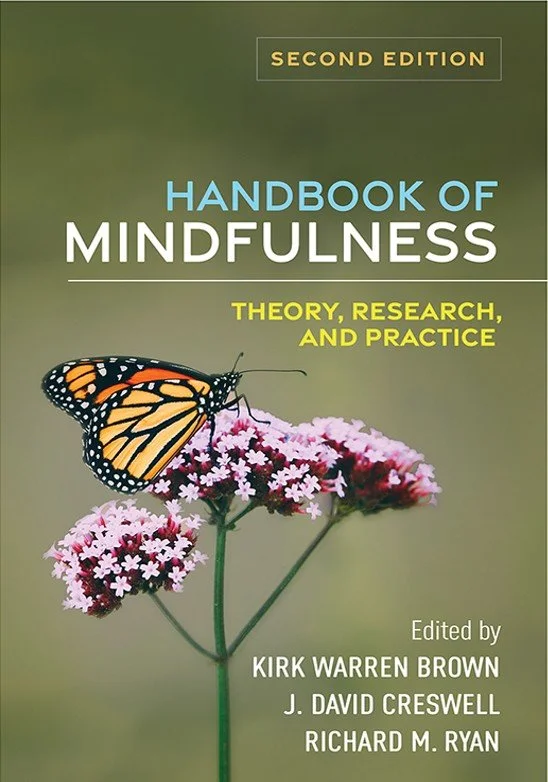Handbook of Mindfulness 2e (2025)
with J. David Creswell and Richard M. Ryan
Reflecting a decade of tremendous growth in mindfulness research and interventions, this authoritative handbook is now in a significantly revised second edition with 75% new material. The volume examines the interface of contemporary psychological science and ancient contemplative traditions. It presents cutting-edge work on the neurobiological, cognitive, emotional, and interpersonal mechanisms and effects of meditative practices. Chapters on exemplary applications review mindfulness-based interventions for both clinical and nonclinical populations.
New to This Edition
Chapters on emotion regulation processes and interventions for chronic pain.
Chapters on interventions in school and work settings.
Chapter on adapting mindfulness-based research and interventions for Black communities.
Chapters on neurophenomenology, process-based research, and Buddhist philosophy.
Buy at Guilford Press.
Handbook of Mindfulness (2015)
with J. David Creswell and Richard M. Ryan
An authoritative handbook, this volume offers both a comprehensive review of the current science of mindfulness and a guide to its ongoing evolution. Leading scholars explore mindfulness in the context of contemporary psychological theories of attention, perceptual processing, motivation, and behavior, as well as within a rich cross-disciplinary dialogue with the contemplative traditions.
After surveying basic research from neurobiological, cognitive, emotional/affective, and interpersonal perspectives, the book delves into applications of mindfulness practice in healthy and clinical populations, reviewing a growing evidence base. Examined are interventions for behavioral and emotion dysregulation disorders, depression, anxiety, and addictions, and for physical health conditions. Buy on Amazon.
Oxford Handbook of Hypo-Egoic Phenomena (2016)
with Mark R. Leary
Egoicism, a mindset that places primary focus upon oneself, is rampant in contemporary Western cultures as commercial advertisements, popular books, song lyrics, and mobile apps consistently promote self-interest. Consequently, researchers have begun to address the psychological, interpersonal, and broader societal costs of excessive egoicism and to investigate alternatives to a "me and mine first" mindset.
For centuries, scholars, spiritual leaders, and social activists have advocated a "hypo-egoic" way of being that is characterized by less self-concern in favor of a more inclusive "we first" mode of functioning. In recent years, investigations of hypo-egoic functioning have been examined by psychologists, cognitive scientists, neuroscientists, and philosophers. The Oxford Handbook of Hypo-egoic Phenomena brings together an expert group of contributors to examine these groundbreaking lines of inquiry, distilling current knowledge about hypo-egoicism into an exceptional resource.
In this volume, readers will find theoretical perspectives from philosophy and several major branches of psychology to inform our understanding of the nature of hypo-egoicism and its expressions in various domains of life. Further, readers will encounter psychological research discoveries about particular phenomena in which hypo-egoicism is a prominent feature, demonstrating its implications for well-being, regulation of emotion, adaptive decision-making,positive social relations, and other markers of human happiness, well-being, and health. This Handbook offers the most comprehensive and thoughtful analyses of hypo-egoicism to date. Buy on Amazon.



